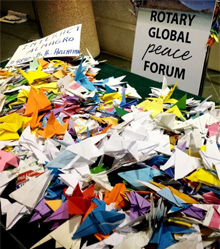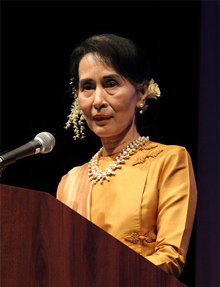Global Peace Forum
Nobel Peace laureate Aung San Suu Kyi receives award at Rotary Global Peace Forum
By Arnold R. Grahl Rotary News — 29 January 2013
- Aung San Suu Kyi addresses the second Rotary Global Peace Forum in Honolulu, Hawaii, USA. Photo by Phil Spalding
Aung San Suu Kyi, leader of Myanmar’s democracy movement and recipient of the Nobel Peace Prize, delivered the keynote address at the Rotary Global Peace Forum held in Honolulu, Hawaii, USA, 25-27 January.
She was honored with the Hawaii Peace Award for her longstanding pursuit of democracy through peaceful, nonviolent means. After 20 years of house arrest, Suu Kyi was released in November 2010, and last year was elected to Myanmar’s parliament as a member of the pro-democracy opposition party.
Suu Kyi told the attendees that absolute peace is an unattainable goal, but one that we must nevertheless continue to endeavor toward. She said that democratic institutions are necessary to guarantee human rights.
“The kind of peace we want is very simple. We want permanent peace,” said Suu Kyi.
She also noted that young people have an important role to play. The Honolulu forum emphasized the importance of getting youth involved in the peace process.
“We must help our young people so that they may be able to take over our task of nation building,” Suu Kyi said. “We depend on our young people to take us forward.” (Watch a video of the address)
Engaging young people
 More than 1,800 Rotarians, Rotary alumni, and supporters of Rotary’s peace program took part in this event, the second of three peace forums planned by RI President Sakuji Tanaka. The first was held in Berlin in November, and a third is planned for Hiroshima, Japan, 17-18 May.
More than 1,800 Rotarians, Rotary alumni, and supporters of Rotary’s peace program took part in this event, the second of three peace forums planned by RI President Sakuji Tanaka. The first was held in Berlin in November, and a third is planned for Hiroshima, Japan, 17-18 May.
“Rotary builds peace and international understanding through education, humanitarian service, and connecting with youth,” Tanaka said. “To ensure a lasting legacy in this arena, we must engage young people and the new generations to come in a meaningful way, and empower them to carry Rotary’s peace-building efforts into the future.”
The forum also addressed environmental conservation as a means of promoting peace. Attendees adopted a declaration supporting The Green Path to Peace, which urges those in the family of Rotary to act as catalysts for peace through efforts that conserve and protect the planet. Read the full resolution.
“An environment that is healthy makes it possible for us to reach our full potential,” Tanaka said. “When our basic needs are met, we are not occupied with the daily problems of survival. There is less cause for conflict. And people and nations who do not waste their energy in conflict can use it in ways that benefit everyone.”
Past RI President Luis V. Giay served as the forum’s convener. The three sites for the peace forums were selected by Tanaka because each was heavily affected by World War II and now represents the healing power of sustainable peace between nations.
“Growing up in Japan after World War II, I saw the importance of peace. I saw the consequences of war,” said Tanaka. “Working for peace is a lifelong task. Every day, in 34,000 clubs around the world, we work together for a more peaceful world by bringing water, health, education, and hope to the people who need it most.”
Books build peace
In his comments to the forum, RI President-elect Ron Burton recalled a book project he took part in years ago in San Antonio, Texas, and how precious it was to see children clutching their new books.
“There is a reason why we do it the way we do, why we go in as a club, in person, and give these things to the kids with our hands, one human being to another. It’s saying, here’s something that will help you, and I am giving it to you because I care,” Burton said. “How do you build a world with more peace? You start with one Rotarian, handing one kid her first book.”
Rotary clubs have long embraced the call for peace at the grassroots level by addressing the underlying causes of conflict and violence, such as hunger, poverty, disease, and illiteracy. Ten years ago, Rotary decided to take a direct approach to promoting world understanding by providing future leaders with the tools they need to “wage peace” on the global stage.
Since 2002, Rotary clubs have annually sponsored up to 60 scholars who embark on one to two years of study — earning either master’s degrees or certificates — in peace and conflict resolution at Rotary Peace Centers at universities around the world.
• Watch a video of Suu Kyi’s address
• Learn more about the third Rotary Global Peace Forum in Hiroshima, Japan
• Download “The Green Path to Peace” declaration
• Read blog posts from the peace forums
peace_declara tion_honolulu_en![]()

